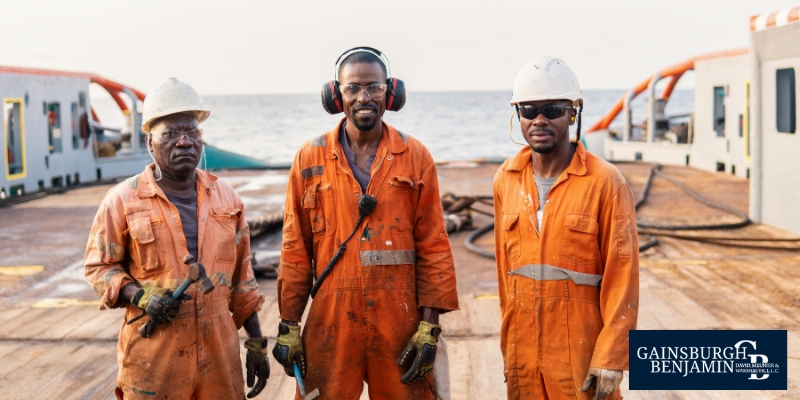The Jones Act can allow an injured seaman to directly file against the owners of the ship. They must prove that the employer did not properly take care of the ship or their employees, which caused the employee to be injured. However, the amount of proof a seaman must provide is less than what is required in a normal personal injury case.
New Orleans Jones Act Seaman Injury Lawyer
New Orleans Jones Act Seaman Injury Attorney
There are certain risks that come with working in some industries, including the maritime industry. This field of work involves waterborne commerce or transporting goods, people, and more across bodies of water. If you’ve been injured while working in the maritime industry, you can seek help from a New Orleans Jones Act seaman injury attorney.
Maritime workers often work with heavy machinery and large loads. They must maintain the highest standard of care and safety to ensure that themselves and their coworkers are safe. However, for one reason or another, maritime accidents do happen. Often, these accidents are quite devastating, leaving workers with life-altering injuries or even killing them.

When a worker fails to live up to this responsibility, a piece of equipment is faulty, or employers do not ensure the workspace is safe, and others sustain injuries, injured employees can file an accident claim under the Jones Act and other maritime laws.
We Build A Strong Case To Obtain
Successful Outcomes For Our Clients
The Jones Act, along with all other maritime laws, are complicated to understand. Not every attorney has experience with these types of accidents or these laws, which puts them at a disadvantage. Fortunately, the personal injury attorneys at Gainsburgh, Benjamin, David, Meunier & Warshauer, L.L.C. possess a thorough understanding of the Jones Act and other maritime laws.
Our understanding of these accidents and the laws that protect maritime workers puts us at an advantage in the courtroom. With the help of our experienced legal team, you put yourself in the best position to recover damages.
The Jones Act
The Jones Act is Section 27 of the Merchant Marine Act of 1920. It protects crew members working within the maritime industry in case they suffer injuries. This act allows them to hold maritime employers and organizations accountable for their negligence, recklessness, or inaction.
Workers may have the right to file claims for recovery against their employers if they suffered seaman injuries while on the job. Our Louisiana and Mississippi attorneys have the best interest in mind for all seaman workers, including:
- Crew members: These workers handle the daily operations on ships. They are important in maintaining vessels and supporting navigation efforts. Even small mistakes from crew members or poor orders from leadership can put these workers in danger.
- Deckhands: Deckhands do more of the physical labor on a vessel, so they are more exposed to extreme weather conditions. If cargo is not properly secured, it can run into deckhands, which can cause crushing injuries. Deckhands can get hurt if their safety equipment fails or they are not properly trained.
- Offshore drilling rig workers: Most of the 69,840 oil drilling operators are in states like Texas, but there are still quite a few in other Gulf States like Louisiana. They work with systems that are prone to explosions, which can lead to injury. This can be complicated because rigs are often in remote areas with delayed medical help.
- Commercial fishermen: Fishermen are often under harsh conditions. The 25,500 individuals in fishing and hunting occupations in 2023 are at risk for injuries, especially during storms or if their equipment breaks. Cold water and sharp tools only add to the danger.
- Oystermen: Oysters are often caught near the shoreline, which can present its own dangers. Working near the shoreline can make slips riskier. Poor conditions like bad weather can make it harder to see if someone gets injured, making it harder to receive help.
- Shrimpers: Fishing boats and shrimp boats often lack a full crew. This means that each worker has more to do and must spend more time working. Increased fatigue can lead to more accidents and injuries. When injuries occur due to unsafe working conditions or negligence, a New Orleans boating accident lawyer can help injured workers pursue the compensation they deserve.
We Build A Strong Case To Obtain
Successful Outcomes For Our Clients
Often, when you suffer a maritime injury, you must go up against big corporations, which can be daunting. However, hardworking maritime professionals deserve justice and compensation for their injuries, regardless of if you work in the Atlantic Ocean, Gulf Coast, or any other navigable waters.
At Gainsburgh, Benjamin, David, Meunier & Warshauer, L.L.C., our team of experienced and dedicated attorneys are here to even the odds. We will work diligently to ensure you recover the compensation you deserve. Give us a call today to schedule your free consultation.
Rights Under the Jones Act
The Jones Act gives seamen the right to work in a safe environment. If they are unable to do this in their current job, they can file a claim if they get hurt. This includes things like unsafe vessels or poorly trained crew members who make dangerous mistakes.
They are also entitled to maintenance and cure. This is a term that covers both living expenses and medical costs while they are recovering from the injury. The victim doesn’t have to prove fault to receive these benefits, unlike a typical personal injury claim.
If negligence does play a role in New Orleans, the Jones Act can give seamen the right to seek more compensation. Instead of partial wages, they could receive full wages and money to compensate them for future lost wages. They could also receive money for pain and emotional stress.
What to Do After an Offshore Injury
Report the injury as soon as possible after it happens. Delays can cause insurance companies and employers to wonder what happened. See a doctor as soon as possible. Try to keep records by writing down what happened shortly afterwards. Get the names of anyone who saw the accident.
If it’s safe to do so, take photos of the scene of the accident to use for later. If an employer tries to get you to sign anything, wait to do so before talking to an expert personal injury lawyer in New Orleans. This could be a strategy used to settle early and leave out money you need later. A Jones Act claim should be based on as much information as possible.
Challenges in Jones Act Cases
Jones Act cases take time. In the meantime, an employer can claim that the worker was at fault for the accident or claim that the accident happened while the employee was working.
Another common challenge in Jones Act cases is that many claims don’t have the strongest evidence. Due to the remote setting, there is normally a lack of video footage or written reports.
An attorney can use evidence from the worker themselves and add professional opinions to build the case. They can also look up safety policies from the employer to check if anything was violated that caused the accident.
The level of legal support can fundamentally change how the case moves forward. There are lots of obstacles that can come up in a Jones Act case that are made worse by aggressive insurance companies or employers. Attorneys help make the case more even for their clients.

FAQs About New Orleans Jones Act Seaman Injury Law
Contact New Orleans Jones Act Seaman Injury Attorney
Louisiana employs the most sailors in the nation, at 6,800 in May 2023. When a sailor gets injured, they rely on things like the Jones Act to get the support they need. Companies can push back against these claims. Schedule a consultation with Gainsburgh, Benjamin, David, Meunier & Warshauer, L.L.C. to fight for compensation.












